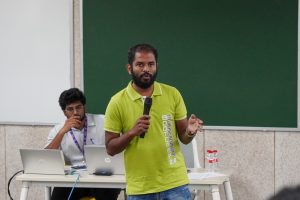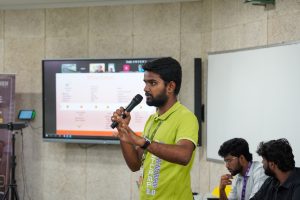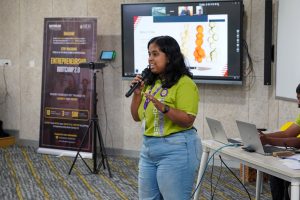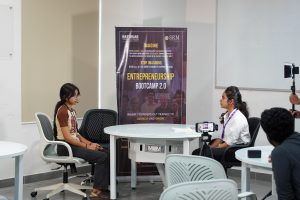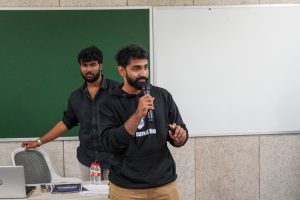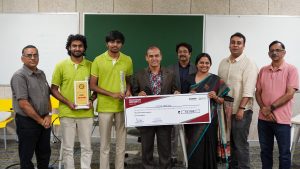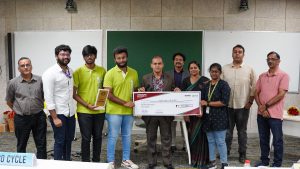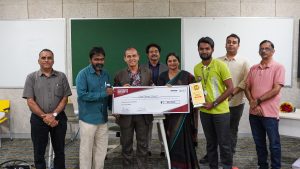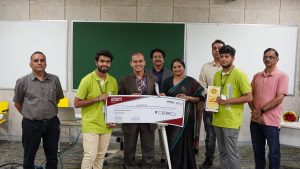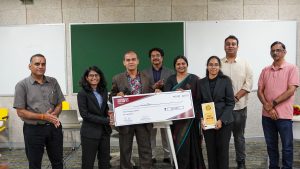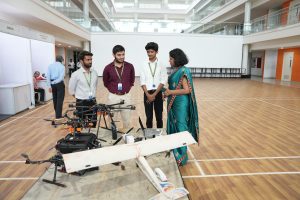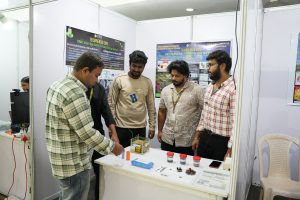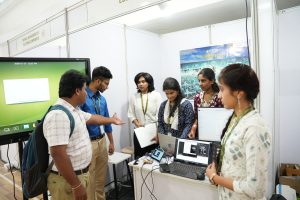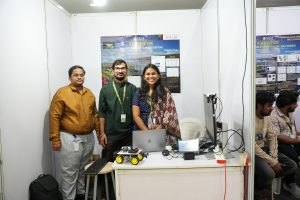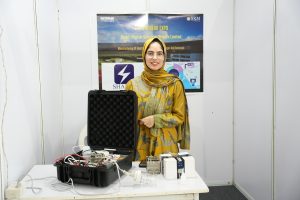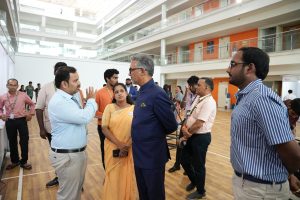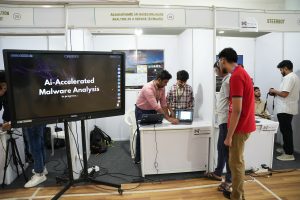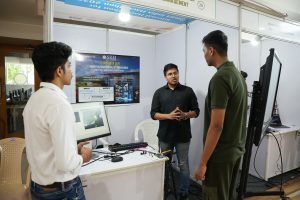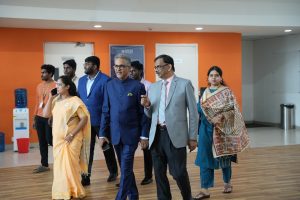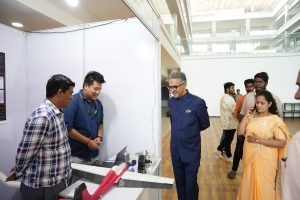Entrepreneurship Bootcamp 2.0: A Journey of Innovation
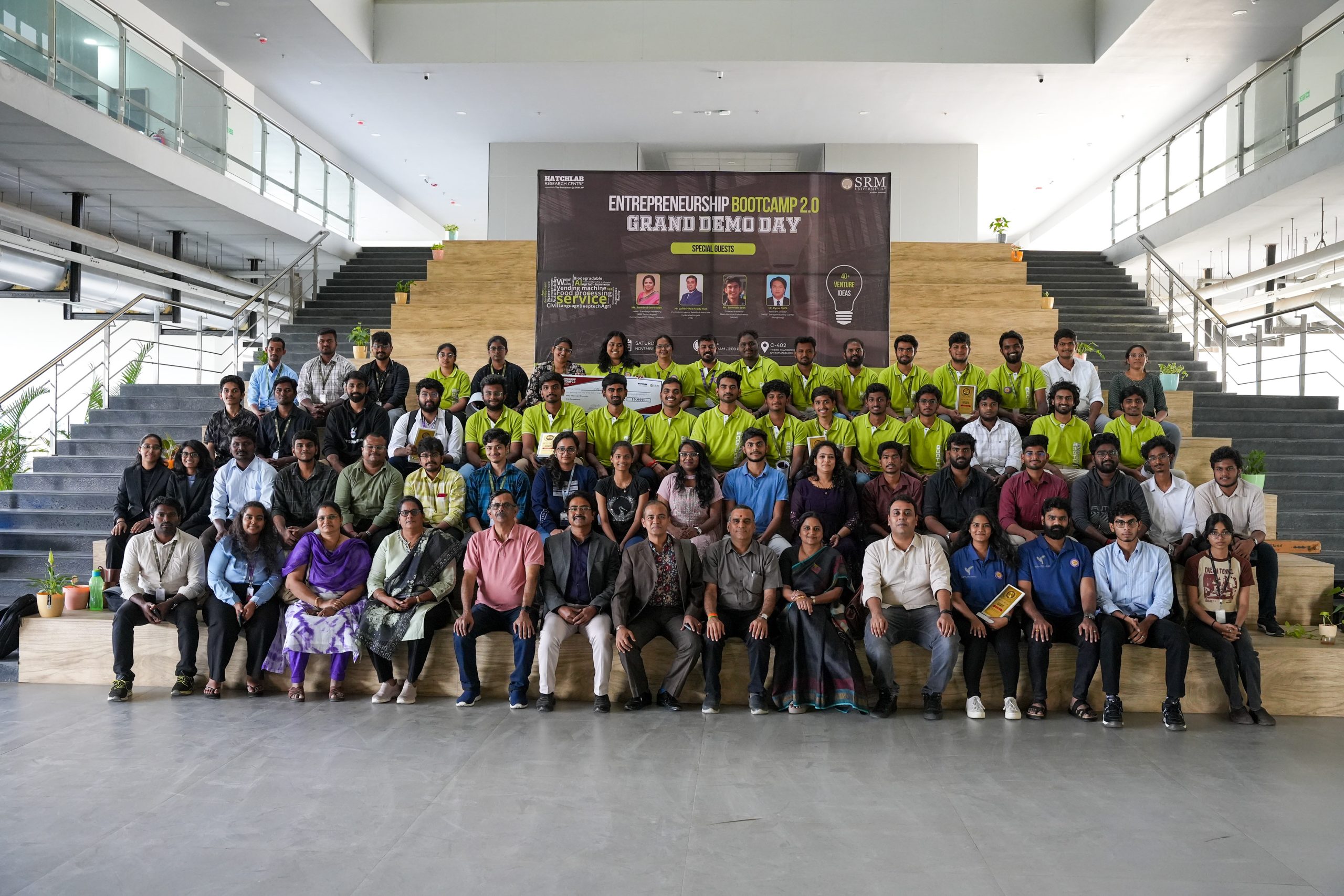 SRM University-AP’s Entrepreneurship Bootcamp 2.0 concluded in style with a vibrant Demo Day, where budding entrepreneurs gathered with innovative ideas, driven by their passion for building successful ventures. The event, held on the university’s Amaravati campus, marked the culmination of a ten-week intensive entrepreneurship training programme designed to foster innovation among students.
SRM University-AP’s Entrepreneurship Bootcamp 2.0 concluded in style with a vibrant Demo Day, where budding entrepreneurs gathered with innovative ideas, driven by their passion for building successful ventures. The event, held on the university’s Amaravati campus, marked the culmination of a ten-week intensive entrepreneurship training programme designed to foster innovation among students.
The Demo Day featured an elite panel of mentors and investors, including Ms Sreedevi Devireddy, Head-Branding & Marketing, ASIP Technologies and Former Head of VDC Gitam University; Mr Cyrus Choi, Assistant Director of the Entrepreneurship Centre at Hong Kong University of Science and Technology (HKUST); Mr Lalith Mitra Reddy Kolli, Portfolio & Investor Relations Associate at Hyderabad Angles; Mr Samridh Seth, Founder, Black Komodo Investments, Dubai along with Prof. Sidharth Tripathy, Director-Entrepreneurship & Innovation, Mr Udayan Bakshi, Associate Director-Entrepreneurship and Innovation, Dr Krovi Raja Sekhar, CEO, Hatchlab Research Centre and Mr Pankaj Belwariar, Director-Communications of SRM University-AP.
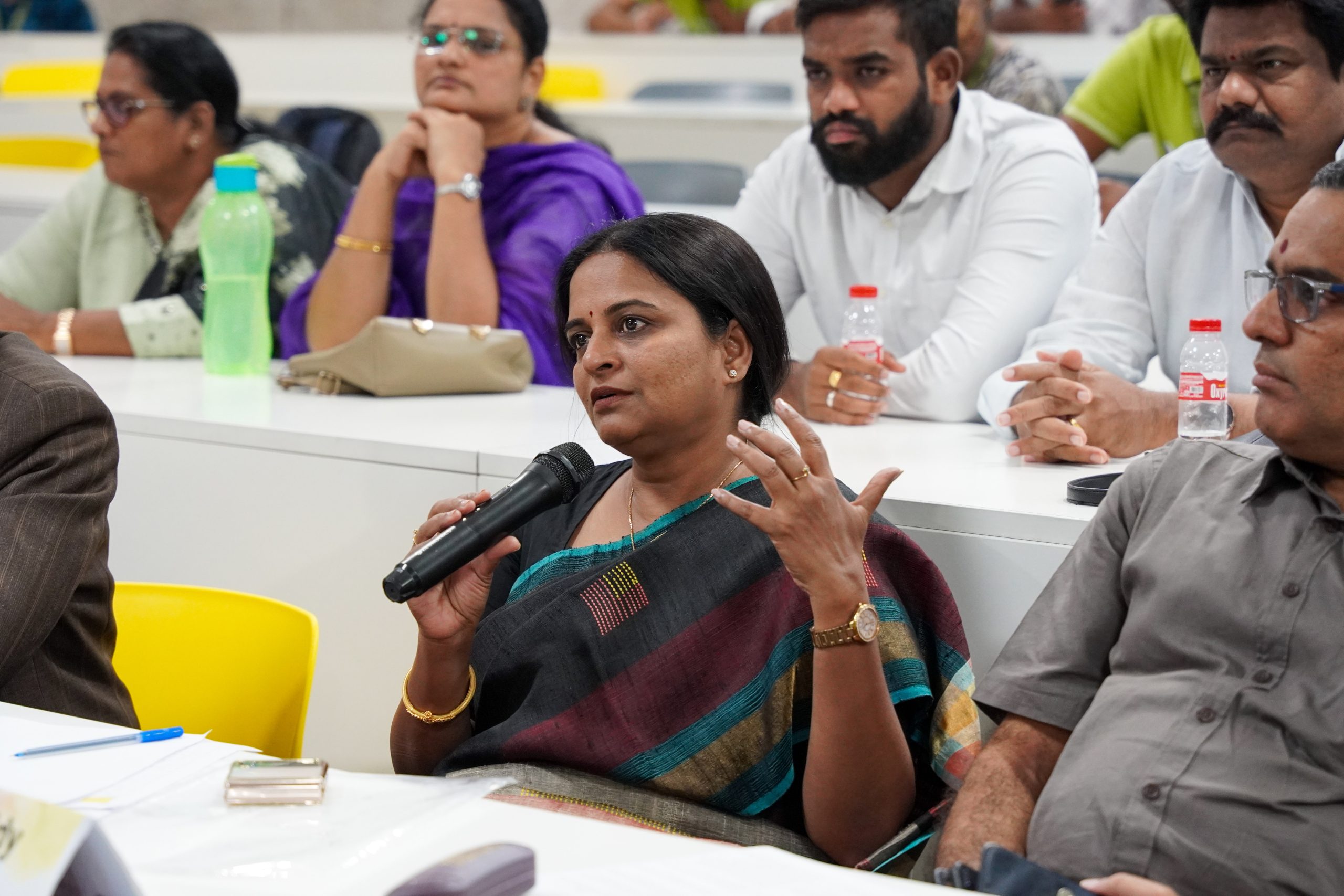 The dynamic presentations by the participants showcased their innovative ideas, business models, and go-to-market strategies. The esteemed panel offered constructive feedback, enabling participants to refine their ventures further. “We approached you as living start-ups, and you rose to the occasion, demonstrating the hunger and drive of true entrepreneurs. Keep that fire alive,” Ms Sreedevi applauded the students.
The dynamic presentations by the participants showcased their innovative ideas, business models, and go-to-market strategies. The esteemed panel offered constructive feedback, enabling participants to refine their ventures further. “We approached you as living start-ups, and you rose to the occasion, demonstrating the hunger and drive of true entrepreneurs. Keep that fire alive,” Ms Sreedevi applauded the students.
The Entrepreneurship Bootcamp 2.0 engaged 85 participants, selected from over 356 applicants after a competitive selection process. Curated by Prof. Sidharth Tripathy, a Harvard alumnus and the Director-Entrepreneurship & Innovation at SRM University-AP, the bootcamp comprised 14 interactive sessions covering ideation, business modelling, and go-to-market planning. The programme included world-class case studies and hands-on mentoring sessions with global experts.
Participants represented ventures in diverse fields such as Waste-to-wealth innovations, Augmented reality, Automobiles, Food processing, AI and Deep tech, Healthcare, Agritech etc. Of the 16 standout ventures identified during the programme, the top 10 teams received incubation grants of ₹50,000 each.
“This event stands as a testament to the passion and dedication of our students. Their hard work has earned them the incubation opportunity that they truly deserve. These grants will support their entrepreneurial journeys through incubation and acceleration at the Hatchlab Research Centre, SRM University-AP’s premier business incubator,” said Prof. Tripathy.
- Published in IDEA NEWS, Innovation, News
Techpreneur Expo-2024: A Grand Showcase of Innovation and Technology
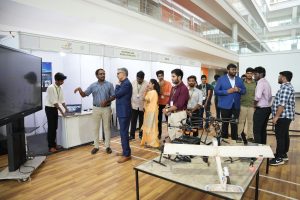 In a significant step forward for innovation and entrepreneurship, the Directorate of Entrepreneurship and Innovation recently organised the highly anticipated Techpreneur Expo-2024. The event, held at SRM University-AP, attracted a host of distinguished guests, including Dr Krish Gopalakrishnan, Co-Founder of Infosys; Mr Rohit Kapoor, CEO of Swiggy; Pro-Chancellor of SRM University-AP, Dr P Sathyanarayanan; Vice Chancellor Prof. Manoj Arora; and Registrar Dr R Premkumar, who lent their support and expertise to this integral gathering.
In a significant step forward for innovation and entrepreneurship, the Directorate of Entrepreneurship and Innovation recently organised the highly anticipated Techpreneur Expo-2024. The event, held at SRM University-AP, attracted a host of distinguished guests, including Dr Krish Gopalakrishnan, Co-Founder of Infosys; Mr Rohit Kapoor, CEO of Swiggy; Pro-Chancellor of SRM University-AP, Dr P Sathyanarayanan; Vice Chancellor Prof. Manoj Arora; and Registrar Dr R Premkumar, who lent their support and expertise to this integral gathering.
The Techpreneur Expo served as a vibrant technical showcase featuring 25 stalls presented by the Department of Next Tech Lab, the Directorate of Entrepreneurship and Innovation, and the Department of Research. Attendees were treated to an impressive array of cutting-edge technologies and projects, ranging from Additive Manufacturing and Bio-Printing to advancements in Robotics and Piezoceramics. Noteworthy projects included Unmanned Aerial Vehicles, IoT applications in Drone Technology, and pioneering RF Frontend Designs for 6G Applications. Environmental sustainability was emphasised through displays on Flexible Solid-State Electrolytes for eco-friendly lithium-ion batteries and the Responsible Management of Electronic Waste, along with initiatives for the Reclamation of Critical Metals aimed at fostering Sustainable Development.
In addition to these advanced technologies, the expo presented innovative projects such as Rechargeable Batteries, Smart Indoor Localization, and Edge AI. Guests and participants had the opportunity to explore the Thermal Management of Electronic Components, Hydrogen Fuel Cells, and Waste Valorization projects that advocate for sustainability. Cutting-edge companies, including SYNC-HAB, SecEn Semiconductors & Test Solutions, and Shakti Photon Solutions Private Limited, showcased their contributions to technology solutions. Moreover, unique offerings like Smart Automation and Self-Optimised Clean Energy Systems, No Wait (a smart solution for lift management), and AI-driven initiatives like ResuMatch for resume mock interviews and AdamantiumRE for malware analysis highlighted the inventive spirit of the event.
Throughout the expo, the esteemed guests visited each stall, commending the quality of the displays and the depth of innovation demonstrated by the students. The event proved to be a resounding success, providing invaluable insights and learning opportunities for students while fostering an atmosphere of collaboration and entrepreneurial spirit within the tech community.
The Techpreneur Expo-2024 not only spotlighted the remarkable talents of budding entrepreneurs and innovators but also set the stage for future advancements in technology, signalling a bright horizon for entrepreneurship and innovation in the region.
- Published in CR&CS Webinars, Departmental News, IDEA NEWS, Innovation, News
SRM AP’s Hatchlab Research Centre Selected as Implementation Agency for GENESIS Scheme
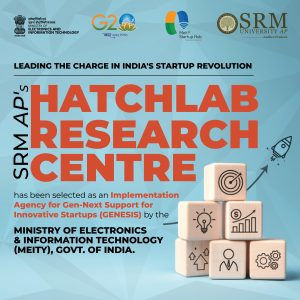 The Directorate of Entrepreneurship and Innovation is thrilled to announce that the Hatchlab Research Centre (HRC), the Technology Business Incubator at SRM University-AP, has been chosen as the Implementation Agency for the “Gen-Next Support for Innovative Startups (GENESIS)” initiative. This decision, made by the Ministry of Electronics & Information Technology (MeitY), Government of India, marks a significant milestone for HRC and highlights its commitment to fostering innovation and entrepreneurship.
The Directorate of Entrepreneurship and Innovation is thrilled to announce that the Hatchlab Research Centre (HRC), the Technology Business Incubator at SRM University-AP, has been chosen as the Implementation Agency for the “Gen-Next Support for Innovative Startups (GENESIS)” initiative. This decision, made by the Ministry of Electronics & Information Technology (MeitY), Government of India, marks a significant milestone for HRC and highlights its commitment to fostering innovation and entrepreneurship.
The GENESIS scheme emerges as a strategic umbrella initiative by MeitY aimed at nurturing and supporting startup ecosystems in Tier II and Tier III cities across India. HRC is among the 50 selected implementation agencies tasked with facilitating this vision, backed by a total budgetary allocation of ₹490 crores. This funding will be instrumental in providing vital resources and infrastructure for startups, ensuring they have the necessary support to thrive in a competitive landscape.
Prof. Sidharth Shankar Tripathy, Director of Entrepreneurship & Innovation of SRM AP, said, ” This announcement is a tribute to the soaring entrepreneurial spirit that is visible among the students, faculty and even the staff of our young entrepreneurial university. What makes this achievement even more special is that it was announced at an appropriate juncture time when SRM University-AP had declared the academic year 2023-24 as the “Year of Entrepreneurship & Innovation.With this new responsibility, we look forward to contributing to the success of startups and innovators across India!”
The HRC’s selection comes at a fortuitous time, as SRM University-AP has declared the 2023-24 academic year to be the “Year of Entrepreneurship & Innovation.” This initiative aims to foster a culture of creativity and entrepreneurial spirit among students, providing them with the tools and support needed to transform their ideas into viable business ventures.
The GENESIS scheme is designed to enhance the startup ecosystem in smaller cities, enabling entrepreneurs outside of metropolitan areas to access essential services, mentorship, and funding opportunities. By selecting HRC as an implementation partner, MeitY acknowledges the centre’s potential to drive impactful change and support innovative startups in the region.
As HRC embarks on this new journey, it promises to create a robust framework that encourages collaboration, knowledge sharing, and the development of sustainable business models among emerging entrepreneurs. The centre will facilitate various programs, workshops, and resources designed to equip startups with the skills, network, and funding requisite for success.
With this prestigious recognition, SRM University-AP’s Hatchlab Research Centre is poised to play a pivotal role in transforming the entrepreneurial landscape, paving the way for a more inclusive and diverse startup ecosystem across the nation.
- Published in Departmental News, IDEA Events, IDEA NEWS, Innovation, News
Active Learning at SRM Amaravati- The present and future of higher education
Active Learning at SRM Amaravati- The present and future of higher education
The growing presence of the Millennials followed by Gen Z has changed the nature of the workforce world over. Their expectations from the workspace are dynamically different from their predecessors. Interestingly, expectations of corporates and the industry have changed too. Problem-solving, decision making, EQ are some of the most sought-after skills now.
Centres for higher learning and educationists have had to rise to the challenge to shape professionals who possess these skills. It has prompted them to adopt new-age learning strategies that lead to the desired growth and development of students. Amongst the strategies, Active Learning is one that has shown exciting results and is definitely here to stay.
What is Active Learning, and what makes it different?
Quite simply, it is an approach to teaching where students are active participants in the learning process. It’s in stark contrast to conventional lecturing where, as a student, you would be a passive recipient of knowledge. Active Learning approach can be implemented in different streams of education equally effectively.
In traditional classrooms, you would have only a few students asking or responding to questions every session. Active Learning changes that as it not only allows but also enables all students to participate in learning activities. However, that does not mean it has to replace the traditional classroom format completely; in fact, it serves as a powerful ally.
What does Active Learning involve?
Active Learning encourages students to participate in big and small activities that revolve around reflecting, responding, writing, solving problems and more. As a student, you would have to spend some amount of time in the classrooms doing these activities either individually or in small groups.
Active Learning, in its simplest form, begins with reflection and pondering over an idea mentioned in the classroom. It can progress through large group discussions, brainstorming, case studies, role-playing to experiential learning, in its levels of complexities. The activities are designed to give students time to assess their understanding and practice skills too.
Astonishing results achieved through Active Learning
Experts recommend certain steps for the successful execution of Active Learning. The trick lies in choosing meaningful activities and explaining the rationale to students. Educators also need to develop a facilitation approach. Finally, faculty members should ideally collect feedback and keep track of it for future reference.
According to studies, Active Learning improves critical thinking skills, interpersonal skills as well as motivation. Freeman study suggested that without active learning, students were 1.5 times more likely to fail a course. Owens, Sadler, Barlow, & Smith-Walters research in 2017 proves the influence of Active Learning on emotional states of students.
These are just some of the reasons why Active Learning has found an active place on higher studies and is the way ahead.
- Published in Blog, Innovation
Ennovab: The Playground Of Next Unicorn
Entrepreneurship at SRM Amaravati: Ennovab-The pulse of Engineering College
“It’s not about ideas. It’s about making ideas happen,” said Scott Belsky, Cofounder of Behance as he spoke of entrepreneurship. His wise words hold a lot of truth as it is often seen with brilliant minds that come up with exceptional ideas, which unfortunately don’t see the light of the day. They need honing, follow-up, and strategic execution.
Those exact words sum up the role of Ennovab at SRM University, Amaravati. The Entrepreneurial Innovation Lab is a student-led activity, which has fostered an ecosystem on campus that is shaping entrepreneurs who lead the way. Sowing the seeds of innovative and entrepreneurial thinking amongst students, it aims to take them closer to their business goals.
Silicon Valley work culture to Amaravati
Ennovab is the brainchild of Piyush Mitra K, Vatsal Rathod, Tuhin Sarkar and Aayushi Biswas, students of SRM University, Amaravati. During their semester abroad program at University of California, Berkeley, they realised the need for a student-led entrepreneurial lab back home to foster the startup culture, which has been at its peak in the Silicon Valley.
What followed were discussions with honorary delegates of Sutardja Centre for Entrepreneurship and Technology. Their guidance was complemented by the strong support the students received from the management of SRM University, Amaravati. That gave birth to Ennovab, which strives to imbibe the renowned business ethics of Silicon Valley.
What does Ennovab do?
In a short period, Ennovab has nurtured entrepreneurial dreams of teams that are now well on their way in their startup journeys. With innovation at the forefront, it’s not surprising that several of these startups have focused on Internet of Things, Artificial Intelligence as well as Extended Reality. That’s blending technology with entrepreneurship for best results.
But it all begins with the desire to add value to the world. New members of Ennovab driven by the goal are mentored through the various stages of startups – ideation, validation, market research, business model construction and finally, venture capitalist presentations. Case studies, brainstorming sessions are a common practice as Ennovab members meet.
Some of the other crucial aspects of the startup journey are networking and making pitches. Through Pitch Days and Founders speed dating events, Ennovab gives its members a taste of what to expect as they venture out into the world of entrepreneurs. Talks by startup heads and gurus, give them insights to navigate their challenging and exciting realm of startups.
India’s growing economy needs more entrepreneurs to take it to its pinnacle. With its activities, Ennovab is playing its part in the startup revolution in the country.
- Published in Blog, Innovation
Next Tech Lab : A Mangrove Of Ideas
When as a student, you get an opportunity to listen to a world leader like the seventh Secretary-General of the United Nations, Kofi Annan, you listen. You take notes and hope the learning pays off at some point in your career. But two students from SRM University took things a step further, and it has resulted in the innovative, buzzing, Next Tech Lab.
As Anshuman Pandey and Aditthya Ramakrishnan did their internship at the MIT Media Lab, US, the multidisciplinary nature of research stood out. The inspiration came from a conversation with Kofi Annan about research brain-drain. The concept note that followed sowed the seeds for first of its kind, student-led lab that has won accolades for itself and its members.
Wide scope and growth of the student-led lab
Next Tech Lab came into being at SRM University (now SRM IST), Kattankulathur and has made its strong presence on the sprawling Amaravati campus too. What makes it unique that it is a complete student-led activity with no faculty in charge. However, the multidisciplinary lab has a board of advisors, including industry bigwigs and academics.
Where ideas create winners
Since its inception, Next Tech Lab has been a success story for student-led innovation. It has been behind prototyping of ideas that have been well received. Some of the work that has emanated from the lab has been published in renowned journals across the world. The work has made top intellectual minds sit up and take notice, offer guidance and mentorship.
The results have also been astounding for individual members and teams of students involved with Next Tech Lab. In the past four years, they have won prizes at around 20 top events, including highly followed hackathons. Earlier this year, Aakanksha Chouhan, 2nd Year CSE student and member of Minsky group at Next Tech Lab gave an invited talk at PyCon X Italia in Florence, Italy. She was the youngest invited and funded speaker at the International Conference on Python programming and its applications.
Innovation is the future of all industries, economies and thereby, the Nations and the world. Next Tech Lab, the only Indian organisation to win the QS Reimagine Education 2018 award, is paving the way for it with student-led innovations, one exciting idea and experiment at a time.
- Published in Blog, Innovation
Education is going online: 5 upsides from the move
COVID-19 stifled activity across the globe in an unprecedented manner. Most industries in almost all countries have been massively impacted but education was disproportionately impacted as schools, colleges, and universities shut down and remain subject to severe restrictions even as reopening begins.
However, given the importance of continuity workarounds were soon found and we now see several courses from secondary school education to post-graduate programs moving online. This has not happened only as a fall-out of the pandemic. Two critical factors are contributing to the spread and popularity of online education:
Need: All full-time courses are time-bound and suspension beyond a few days is not sustainable. Besides, students in on-going programs would prefer to stick to their schedule and be prepared with their qualifications in time for the post-pandemic economic revival.
Availability of resources: With widespread acceptance of laptop, computer and tablet for study along with the affordable data access are acting as catalyst for their learning. Rise of video conferencing tools like Zoom, Google Meet, Webex, skype etc made it fairly easy to connect students to classes and peers. All these resources have empowered their learning
The move has come with challenges. Nonetheless, everyone seems to have adjusted quickly and quite well to the new normal. This is thanks to several advantages, of which the most significant is that it keeps people at home and safe. Besides this, 5 primary advantages are:
- Reach: Online education obviously has a much wide reach as the constraint of classroom capacity is removed. This helps content and instruction from the same faculty size reach more students. SRM AP has proactively joined what might be the world’s largest remote learning experiment, collaborating with Zoom Platform where they host online classes. At present, over 40-60 classes are being conducted online daily.
- Recall: Webcams used in online sessions keep a focus on the student and a check on attention. Besides this, recordings of the session are usually available to quickly recap what has happened and students can also take screenshots of sessions for future reference. At SRM AP various LMS platforms – GSuite Classroom, Moodle, etc. are being used by the faculty to share the reading materials with the students.
- Extending use of media: Online classes at SRM AP use high end media to ensure continuous engagement between faculty and students. To make a classroom engaging, faculty members have started adding YouTube videos related to topics, diffusing knowledge through storytelling.
- Promoting reskilling and retooling: With rising joblessness and underemployment, there are several potential students across the world right now. They are keen to reskill and retool in a downturn so that they are well-equipped for the revival. Online education provides such students with depth and breadth in choices. Wider recognition of online courses by employers has also helped.
- Encouraging self-discipline and responsibility: Students have responded with a high degree of self-discipline in attending live classes and shown the responsibility to complete assigned course work despite the lack of supervision. The benefit of this obviously extends far beyond the completion of the program. It creates a value system that can benefit the students for the rest of their lives in all spheres.
Given the nature of this pandemic, online education is now not a matter of choice. And just as well – barring a few minor inconveniences (which too will be overcome with time, some effort and practice), this medium offers several advantages pandemic or no pandemic.
- Published in Blog, Innovation
SRM AP Students: Geared For The Post-COVID-19 Recovery
Economies and businesses have been in a constant state of flux and disruption, especially since the start of the 21st Century. Globalisation, technology, automation, and outsourcing are some of the factors that have contributed to this trend.
The COVID-19 pandemic has given new meaning to the term ‘disruption’! The world has literally changed from what it was merely 8-10 weeks ago. As the world looks towards a reopening and recovery, skill sets, ways of working, methods of collaboration, and urgent economic needs…everything will undergo a transformation and will require significant adjustments from everyone.
At SRM University, Andhra Pradesh we have always focused on imbibing skills sets in our students that can help them compete and contribute effectively in a dynamic world. This approach comprises of several distinct interventions that are embedded into what is taught and how it is taught, including:
Selection Process
The University follows a high technical qualification standard for students applying to either School of Engineering and Applied Sciences (SEAS) and School of Liberal Arts and Basic Sciences (SLABS). There is equal emphasis on the personal interview process also. This process looks for achievers and keen learners who display both a strong track record of achievement as well as a desire to grow through learning. Besides this, we maintain a standard of diversity in the batches, which serves as a source of learning as well as preparation for the diversity seen in real life.
Liberal Arts Education
All SEAS and SLABS courses have common emphasis on liberal arts education. This approach towards higher education consists of a focus on four primary areas: the natural sciences, social sciences, arts, and humanities. The approach towards teaching all subjects is a blended one wherein influences from one sphere are used in another. This is useful since real life problems do not come compartmentalised and their solutions usually draw upon other apparently unrelated areas. Eg. a production constraint in operations that needs to be optimised through the labour force will need to employ an understanding of psychology. Or take the example of biomechanics, which draws upon medicine, biology, and robotics. At SRM University, Andhra Pradesh our inter-disciplinary programs facilitate flexibility in learning, which ultimately leads to broad thinkers with depth in their chosen field. Our six foundation courses across all our undergraduate program enable critical thinking and encourage becoming a thought leader. More formally, our students can opt for Minors in completely unrelated areas to broaden their knowledge and explore personal interests.
Experiential Learning
“Tell me and I forget. Teach me and I will remember. Involve me and I learn” – Benjamin Franklin.
Students have a real need and desire for applying their learning. At SRM University, Andhra Pradesh various initiatives such as industry-driven Undergraduate Research Opportunities (UROP), capstone projects, industry internships and a technology-enabled active learning environment enable our students to implement their learnings in real life settings. This enables them to prepare for complex problems right from the undergrad level.
Special Modules
Initiatives and modules such as FabLab, Next Tech Lab, and IDEA provide our students with a novel and hands-on learning experience. While the emphasis is on theory, the ultimate objective is problem solving abilities. Needless to say, the world is going to need more problem solvers and fewer theorizers in challenging times. Students also have an option in their 4th year to undertake certificate or diploma programs in India or abroad.
International Exposure
Besides this, several international collaborations provide our students with valuable opportunities to benefit from some of the premier institutions in the USA and other countries. In a world unified against a common threat, world-class international exposure will go a long way in preparing professionals for the challenges ahead.
These are only some of the specific initiatives at SRM University, Andhra Pradesh targeted at providing students with not just a degree, but an education. Making them not just job seekers, but real thinkers.
- Published in Blog, Innovation
Rebooting Education With New Age Advancements
“Education is not the learning of facts but the training of the mind to think,” said Albert Einstein. In recent years, there has been a sea-change in the understanding of what we need from professionals of tomorrow. We need thinkers and thought-leaders that can shape the future. Interestingly it has coincided with new-age digital disruptions that have made information easily accessible to Gen Z. Knowledge acquisition for them, is not limited to classroom learning. The new Internet age has practically made traditional modules of learning redundant.
Traditional learning worked on “one size fits all” model with the unreasonable expectation that all students have similar capabilities. If learning institutions and educators have to keep up with the evolving demands of the industry and Gen Z learners, they have to embrace new-age advancements. These pedagogies and technologies encourage students to be inquisitive, to explore and innovate. New age universities like SRM – AP, Andhra Pradesh have already incorporated these advancements in their learning experiences for students.
Multi-stream learning
“Interdisciplinary communication is where truly great ideas emerge,” said Carl Seger. As work environments get more collaborative across functions, it’s vital for future professionals to have insights into streams that are beyond their domain. Moreover, experts also assert that multidisciplinary learning encourages lateral thinking, which is a sought after trait in tomorrow’s professionals and leaders.
Active Learning
Active Learning places greater responsibility for learning on students as they are actively involved through case studies, role plays etc. It does not diminish the role of the instructor but simply puts more onus on learners, which develops problem-solving skills amongst them. Application cards, minute papers, visual modeling are some of the advances in strategies that are being adopted by leading learning institutions today.
Artificial Intelligence
AI become the buzzword and is certainly here to stay. It has revolutionized the way curriculums are delivered across schools and Universities. AI has the capability to arm educators with insights to understand students’ performance, their strengths and weaknesses. This information can be used by educators to offer more personalized guidance to suit their specific needs. AI tools overall generate a more dynamic learning experience for students.
Virtual and Augmented Reality
Virtual Reality has taken the education sector by storm due to the truly immersive experience it creates for learners. It makes it easier for students to process and absorb the information they are getting. Augmented Reality through the mediums of video clips, images, animations etc. create a real-time experience while keeping students engaged. Experts believe it can enhance creativity, problem-solving skills and critical thinking skills amongst students.
Remote to Hybrid learning
Remote learning was already gaining prominence before it was necessitated by the pandemic this year. The potential of virtual classrooms is limitless as high-quality learning is made available to students across the planet. Modern technologies like Zoom, social media, video-conferencing are being leveraged to deliver highly productive sessions for educators and students alike. These learning experiences complement offline learning into a powerful Hybrid learning module.
Education sector as we knew it has gone through a reboot. It’s up to learning institutions and academics to keep pace and put their best step forward. Some of the pioneers of new-age education in India like SRMAP are already leading the way.
- Published in Blog, Innovation
Skills To Ace In The Post Covid World
Fear of the Unknown is the greatest fear of all, they say. It’s that fear that we have almost universally dealt within this year of uncertainty. The word “new normal” has been coined and is talked about by experts in great detail. But what does it truly entail? How do professionals of today and tomorrow navigate their way through the new normal on their way to success? It’s time to upskill, but what are the skills that will be in demand in the post-Covid world?
The new world might be mired in uncertainty, but one thing is certain – that workspaces will see a transformation in times to come. If you want to make your mark in the changing professional scenario then here are skills you should possess:
-
Adaptable professionals for the flexible work environment: Work from home has already become a norm for companies big and small. Workspaces will keep evolving rapidly in times to come. As a professional, you need to keep pace with the changes or be left behind.
-
Get what it “techs”: Technologies like Artificial Intelligence, Big Data, Robotics, IoT had already made their presence felt before the pandemic. They will make businesses more resilient in the post-CoVid world. Being equipped with skills in the latest technologies is the surest way to futureproof your careers.
-
Data with destiny: Data has become the most valuable asset for organizations. But as Bernard Merr writes in Forbes, “Data is useless to a company unless there is data literacy – people equipped with skills to understand the data and make better decisions because of it.” Data literacy skills will score high on companies’ priority list.
-
Innovators have a way in: In spite of the difficulties this year, some businesses have thrived. It’s largely because of the creativity they have shown in catering to their audience through innovative strategies. In the future too, organizations will be focused on professionals who can think and function creatively.
-
Critical thinking will be critical: With great amounts of data, comes great responsibility to analyze it discerningly. The rise of fake news, misinformation has been a menace in the recent past. The industry will be looking for critical thinking professionals, who can scrutinize information for objective decision making.
-
Leaders are forever: Technological disruptions with the changing nature of the workplace have meant that teams and teamwork have become more fluid. It will take strong and capable leaders with high EQ to bring out the best in their teams. Leaders who can encourage and enable seamless collaborations will be highly sought after.
Research and innovation-driven Universities like SRM University – AP, Andhra Pradesh have already incorporated platforms and initiatives in their curriculum to equip students with these skills. “We, at SRMAP, believe that the Universities and educational institutions need to trigger the thought process and inquisitiveness to go beyond the classrooms and textbooks,” says Prof. D. Narayana Rao, Pro-Vice-Chancellor of the University. And it’s this inquisitiveness and thinking out of the box that will make all the difference in the post-CoVid world.
- Published in Blog, Innovation
- 1
- 2


